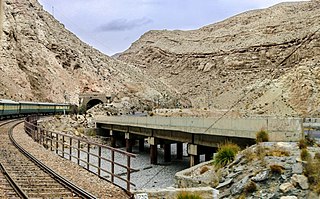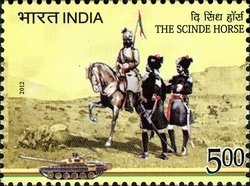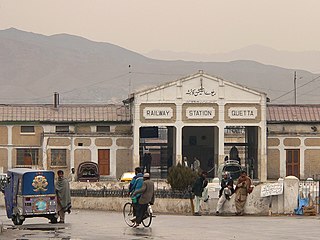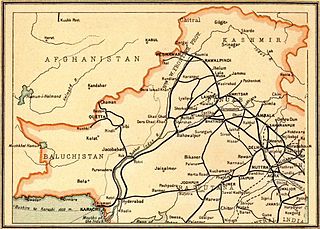Related Research Articles

Pakistan Railways is the national, state-owned railway company of Pakistan. Founded in 1861 and headquartered in Lahore, it owns 7,791 kilometres of track across Pakistan, stretching from Torkham to Karachi, offering both freight and passenger services.

Bolān Pass is a mountain pass through the Toba Kakar range in Balochistan province of Pakistan, 120 km (75 mi) from the Afghanistan border. The pass is an 89 km (55 mi) stretch of the Bolan river valley from Rindli in the south to Darwāza near Kolpur in the north. It is made up of a number of narrow gorges and stretches. It connects Quetta with Sibi by road and railway.
The Toba Achakzai or Khwaja Amran is an offshoot of the Toba Kakar range of mountains, north of Chaman, in Balochistan, Pakistan, on the border with Afghanistan. It is crossed by N-25 National Highway and Rohri–Chaman Railway Line that passes through the Khojak railway tunnel. The grave of Khwaja Amran Baba is located at the peak.

Sibi is a district in the Balochistan province of Pakistan. The main mountain ranges are Zen, Bambore and Dungan. The climatic and topography of Sibi District is quite varied compared to other districts of Balochistan. It is also known as the "Hot spot" of Pakistan where the temperatures in the summer exceed 52.6 °C (126.7 °F). Until 2013 the district had two sub-divisions, Sibi and Lehri, further organized into Tehsils and sub-tehsils: Sibi, Lehri, Kutmandi and Sangan. Lehri was rejoined with Sibi district in 2018.

Zhob, formerly known as Fort Sandeman or Appozai, is a city and district capital of Zhob District in Balochistan province of Pakistan. Zhob is located on the banks of Zhob River 337 km from Quetta, the capital of Balochistan. The city was originally named Appozai after a nearby village. During the British colonial era it was named Fort Sandeman. It obtained its current name on 30 July 1976 when the then-Prime Minister of Pakistan, Zulfikar Ali Bhutto had the name changed.

The Ministry of Railways is a ministry of the Government of Pakistan tasked with planning, administrating and overseeing government policies for the development of the national rail network, Pakistan Railways. Originally a department of the Ministry of Communications, in May 1974 it formed into an autonomous ministry of the federal government. The ministry headquarters is located at Block D of the Pak Secretariat in Islamabad.
Rail transport in Pakistan began in 1855 during the British Raj, when several railway companies began laying track and operating in present-day Pakistan. The country's rail system has been nationalised as Pakistan Railways. The system was originally a patchwork of local rail lines operated by small private companies, including the Scinde, Punjab and Delhi Railways and the Indus Steam Flotilla. In 1870, the four companies were amalgamated as the Scinde, Punjab & Delhi Railway. Several other rail lines were built shortly thereafter, including the [[Sind–Sagar Railway| ] and Trans–Baluchistan Railways and the Sind–Pishin, Indus Valley, Punjab Northern and Kandahar State Railways. These six companies and the Scinde, Punjab & Delhi Railway merged to form the North Western State Railway in 1880. Following independence in 1947, the North Western Railway became Pakistan Western Railway and the rail system was reorganised; some of the reorganisation was controversial. Rail use increased in early 1948, and the network became profitable. Declining passenger numbers and financial losses in the late 1980s and early 1990s prompted the closure of many branch lines and small stations. The 1990s saw corporate mismanagement and severe cuts in rail subsidies. Due to falling passenger numbers, government subsidies are necessary to keep the railways financially viable.
Bostan (بوستان) is a town, 30 km by road (18.64 mi) from Quetta city in the Balochistan province of Pakistan.It is located at 30°25'57N 67°00'22E and has an altitude of 1593 metres. Bostan is Tehsil of the Pishin District. It was previously included in Tehsil Karezat and covers an area between Mount Takathu and the Red Hills.

The Scinde Horse is an armoured regiment in the Armoured Corps of the Indian Army. The regiment, known before independence as the 14th Prince of Wales's Own Scinde Horse was a regular cavalry regiment of the Bombay Army, and later the British Indian Army.

Quetta railway station is the main railway station of Quetta, Balochistan, Pakistan and serves as a major station on the Rohri-Chaman Railway Line and the eastern terminus of the Quetta-Taftan Railway Line.
The Khyber Pass Railway was one of several railway lines in Pakistan, operated and maintained by Pakistan Railways. The line begins at Peshawar City and ended at Landi Khana. The total length of this railway line is 58 kilometers (36 mi) with 13 railway stations.

The North Western State Railway (NWR) was formed in January 1886 from the merger of the Scinde, Punjab & Delhi Railway, the Indus Valley State Railway, the Punjab Northern State Railway, the eastern section of the Sind–Sagar Railway and the southern section of the Sind–Pishin State Railway and the Kandahar State Railway.

The Ambala–Attari line is a railway line connecting Ambala Cantonment in the Indian state of Haryana and Attari in Punjab. The line is under the administrative jurisdiction of Northern Railway.

Karachi–Peshawar Railway Line is one of four main railway lines in Pakistan, operated and maintained by Pakistan Railways. The line begins from Karachi City station or Kiamari station and ends at Peshawar Cantonment Station. The total length of this railway line is 1,687 kilometers (1,048 mi). There are 184 railway stations from Kiamari to Peshawar Cantonment on this line. The line serves as the main passenger and freight line of the country. 75% of the country's cargo and passenger traffic uses the line. The line is currently undergoing a six-year ₨1286.68 billion (US$8.0 billion) upgrade and renovation as part of the China Pakistan Economic Corridor, with average rail speeds expected be doubled to 160 kilometers per hour upon completion.
Rohri–Chaman Railway Line is one of four main railway lines in Pakistan, operated and maintained by Pakistan Railways. The line begins from Rohri Junction station and ends at Chaman station. The total length of this railway line is 523 kilometers (325 mi). There are 35 railway stations from Rohri Junction to Chaman on this line and is famous for passing through the historic Bolan pass. This line incorporates part of the historic Sind–Pishin State Railway.
The Scinde Railway was one of the pioneering railway companies that operated in Sind during the British Raj between 1855 and 1885.
The Indus Valley State Railway was a railway founded in 1871 to provide a rail link between Kotri and Multan and to replace the Indus Steam Flotilla. The opening of the line thus connected Karachi with Lahore.
The Sind–Sagar Railway was originally constructed as a Metre Gauge railway line from Lala Musa to Malakwal. In 1886 the Sind–Sagar Railway was amalgamated with other railways to form the North Western State Railway and railway line from was converted to broad gauge. The Chak Nizam Bridge, also known as Victoria Bridge, was completed in early 1887 over the Jhelum river in Shahpur District and connected Jhelum to Lahore. The NWR Sind-Sagar Branch Line was the new name for the line and continued to be extended with branch lines and designated as part of the 'Frontier Section - Military Line'.
The Kandahar State Railway opened c.1881, originally ran from Sibi and then on wards to Rindli, with the intention to reaching Quetta and onwards to Kandahar. However, the line never reached Quetta. The Kandahar State Railway joined with the southern section of the Sind–Pishin State Railway and in 1886 amalgamated, with other railways, to form North Western State Railway (NWR).

Operations against the Marri and Khetran tribes was the British name for a punitive expedition carried out against the Marri and Khetran tribes of Balochistan, British India between February and April 1918. The Marri rose against the British authorities around 18 February, encouraged by rumours that the British were short of manpower due to the First World War. British attempts at conciliation were repulsed and, on 20 February, a major attack was made by 1,000 – 3,000 Marri upon the British post at Gumbaz. This attack was repulsed by a much smaller British force that inflicted heavy losses upon the Marri. A subsequent withdrawal of British forces from Kohlu and its occupation by the Marri led the Khetrans to join the rising. The town of Barkhan was occupied by Marri-Khetran forces and raids were made upon villages in the Sibi and Loralai districts; railways in the area were also attacked.
References
- The spelling of Scinde, Punjaub & Delhi Railway is variable. Scinde and Punjaub are the spellings adopted in the legislation - see "Government Statute Law Repeals 2012" pages 134-135, paragraphs 3.78-3.83. [6]
- ↑ Grace's Guide "Sind-Pishin Railway""; Retrieved 2 May 2016
- ↑ Great Britain. India Office (1819). The India List and India Office List for ... Harrison and Sons. pp. 427–.
- ↑ Great Britain. India Office (1819). The India List and India Office List for ... Harrison and Sons. pp. 610–.
- ↑ India Civil List 1890, page 40/41
- ↑ India Civil List 1890, page 40/41
- ↑ H.M. Government “Statute Law Repeals: Nineteenth Report : Draft Statute Law (Repeals) Bill; April 2012"; pages 134-135, paragraphs 3.78-3.83 Retrieved on 14 Jun 2016